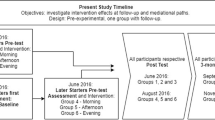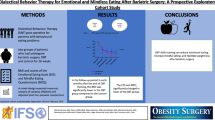Abstract
Purpose
This pilot study aimed to analyze the effects of an adapted dialectical behavior therapy (DBT) skills training group on problematic and adaptive eating behaviors in Brazilian obese individuals.
Methods
Thirty-one obese individuals were randomly assigned to 10 sessions of adapted DBT skills training (n = 14) or two months of a waiting list comparison condition (n = 17).
Results
Attrition rates were similar to what’s been found in comparable studies, with most dropouts happening at the beginning of the treatment. Results showed improvements in binge eating severity (d = 0.80) and depression (d = 0.82) compared to no treatment condition. After the intervention, adaptive eating and distress outcomes showed an improvement trend, reaching nonclinical levels for most participants in the intervention group. Large to moderate between-group effect sizes were observed, but none of those were statistically significant. Large within-group effect sizes were observed in the intervention group in binge eating severity (d = 1.34), intuitive eating (d = 1.33) and depression (d = 1.12). Medium effect sizes were observed in emotional eating (d = 0.73) and in emotion regulation (d = 0.72). Despite positive outcomes in other variables, mindful eating worsened after the intervention (d = 0.66).
Conclusions
These results are preliminary and require further replications with larger samples, yet they suggest that the intervention may be useful to improve distress outcomes and adaptive eating among obese people. Implications for clinical practice and recommendations for future research are discussed.
Level of evidence
Level I, randomized controlled trial.


Similar content being viewed by others
References
World Health Organization [WHO] (2016) Obesity and overweight. http://www.who.int/mediacentre/factsheets/fs311/en/. Accessed 13 Sept 2016
Malta DC, Stopa SR, Iser BPM, Bernal RTI, Claro RM, Nardi ACF, Reis AAC, Monteiro CA (2015) Fatores de risco e proteção para doenças crônicas por inquérito telefônico nas capitais brasileiras, Vigitel 2014. Rev Bras Epidemiol 18(2):238–255. https://doi.org/10.1590/1980-5497201500060021
Scott KM, Bruffaerts R, Simon GE, Alonso J, Angermeyer M, Girolamo G et al (2008) Obesity and mental disorders in the general population: results from the world mental health surveys. Int J Obes 32(1):192–200. https://doi.org/10.1038/sj.ijo.0803701
Sansone RA, Sansone LA (2013) The relationship between borderline personality and obesity. Innov Clin Neurosci 10(4):36–40
Hruby A, Hu FB (2015) The epidemiology of obesity: a big picture. Pharmacoeconomics 33(7):673–689. https://doi.org/10.1007/s40273-014-0243-x
Raman J, Smith E, Hay P (2013) The clinical obesity maintenance model: an integration of psychological constructs including mood, emotional regulation, disordered overeating, habitual cluster behaviours, health literacy and cognitive function. J Obes. https://doi.org/10.1155/2013/240128
Whiteside U, Chen E, Neighbors C, Hunter D, Lo T, Larimer M (2007) Difficulties regulating emotions: do binge eaters have fewer strategies to modulate and tolerate negative affect? Eat Behav 8(2):162–169. https://doi.org/10.1016/j.eatbeh.2006.04.001
Leehr EJ, Krohmer K, Schag K, Dresler T, Zipfel S, Giel KE (2015) Emotion regulation model in binge eating disorder and obesity—a systematic review. Neurosci Biobehav Rev 49:125–134. https://doi.org/10.1016/j.neubiorev.2014.12.008
Zeeck A, Stelzer N, Linster HW, Joos A, Hartmann A (2011) Emotion and eating in binge eating disorder and obesity. Eur Eat Disord Rev 19(5):426–437. https://doi.org/10.1002/erv.1066
Polivy J, Herman CP (1993) Etiology of binge eating: psychological mechanisms. In: Fairburn CG, Terence WG (eds) Binge eating: nature, assessment, and treatment. The Guilford Press, New York, pp 173–205
Arnow B, Kenardy J, Agras WS (1995) The emotional eating scale: the development of a measure to assess coping with negative affect by eating. Int J Eat Disord 18(1):79–90. https://doi.org/10.1002/1098-108X(199507)18:1<79::AID-EAT2260180109>3.0.CO;2-V
Geliebter A, Aversa A (2003) Emotional eating in overweight, normal weight, and underweight individuals. Eat Behav 3:341–347. https://doi.org/10.1016/S1471-0153(02)00100-9
Linehan MM (1993) Cognitive-behavioral treatment of borderline personality disorder. The Guilford Press, New York
Lenz AS, Taylor R, Fleming M, Serman N (2014) Effectiveness of dialectical behavior therapy for treating eating disorders. J Couns Dev 92(1):26–35. https://doi.org/10.1002/j.1556-6676.2014.00127.x
Roosen MA, Safer D, Adler S, Cebolla A, Van Strien T (2012) Group dialectical behavior therapy adapted for obese emotional eaters; a pilot study. Nutr Hosp 27(4):1141–1147. https://doi.org/10.3305/nh.2012.27.4.5843
Mushquash AR, McMahan M (2015) Dialectical behavior therapy skills training reduces binge eating among patients seeking weight-management services: preliminary evidence. Eat Weight Disord 20(3):415–418. https://doi.org/10.1007/s40519-015-0177-0
Himes SM, Grothe KB, Clark MM, Swain JM, Collazo-Clavell ML, Sarr MG (2015) Stop regain: a pilot psychological intervention for bariatric patients experiencing weight regain. Obes Surg 25(5):922–927
Linehan MM, Wilks CR (2015) The course and evolution of dialectical behavior therapy. Am J Psychother 69(2):97–110
Caldwell KL, Baime MJ, Wolever RQ (2012) Mindfulness based approaches to obesity and weight loss maintenance. J Ment Health Couns 34(3):269
Katterman SN, Kleinman BM, Hood MM, Nackers LM, Corsica JA (2014) Mindfulness meditation as an intervention for binge eating, emotional eating, and weight loss: a systematic review. Eat Behav 15:197–204. https://doi.org/10.1016/j.eatbeh.2014.01.005
Godfrey KM, Gallo LC, Afari N (2015) Mindfulness-based interventions for binge eating: a systematic review and meta-analysis. J Behav Med 38(2):348–362. https://doi.org/10.1007/s10865-014-9610-5
Kristeller JL, Hallett CB (1999) An exploratory study of a meditation-based intervention for binge eating disorder. J Health Psychol 4(3):357–363. https://doi.org/10.1177/135910539900400305
Tribole E, Resch E (1995) Intuitive eating: a recovery book for the chronic dieter: rediscover the pleasures of eating and rebuild your body image. St Martins Pr
Tylka TL (2006) Development and psychometric evaluation of a measure of intuitive eating. J Couns Psychol 53(2):226. https://doi.org/10.1037/a0030893
Safer DL, Telch CF, Agras WS (2001) Dialectical behavior therapy for bulimia nervosa. Am J Psychiatry 158(4):632–634. https://doi.org/10.1176/appi.ajp.158.4.632
Safer DL, Robinson AH, Jo B (2010) Outcome from a randomized controlled trial of group therapy for binge eating disorder: comparing dialectical behavior therapy adapted for binge eating to an active comparison group therapy. Behav Ther 41(1):106–120. https://doi.org/10.1016/j.beth.2009.01.006
Telch CF, Agras WS, Linehan MM (2001) Dialectical behavior therapy for binge eating disorder. J Consulting Clin Psychol 69(6):1061–1065. https://doi.org/10.1037/0022-006X.69.6.1061
Craig P, Dieppe P, Macintyre S, Michie S, Nazareth I, Petticrew M (2008) Developing and evaluating complex interventions: the new Medical Research Council guidance. Br Med J 337:a1655
Bowen DJ, Kreuter M, Spring B, Cofta-Woerpel L, Linnan L, Weiner D, Bakken S, Kaplan CP, Squiers L, Fabrizio C, Fernandez M (2009) How we design feasibility studies. Am J Prev Med 36(5):452–457. https://doi.org/10.1016/j.amepre.2009.02.002
Linehan MM (2015) DBT skills training manual, 2nd edn. The Guilford Press, New York
Bernal G, Bonilla J, Bellido C (1995) Ecological validity and cultural sensitivity for outcome research: issues for the cultural adaptation and development of psychosocial treatments with Hispanics. J Abnorm Child Psychol 23(1):67–82
Narrow WE, Clarke DE, Kuramoto SJ, Kraemer HC, Kupfer DJ, Greiner L, Regier DA (2013) DSM-5 field trials in the US and Canada, Part III: development and reliability testing of a cross-cutting symptom assessment for DSM-5. Am J Psychiatry 170(1):71–82. https://doi.org/10.1176/appi.ajp.2012.12071000
Gratz KL, Roemer L (2004) Multidimensional assessment of emotion regulation and dysregulation: development, factor structure, and initial validation of the Difficulties in Emotion Regulation Scale. J Psychopathol Behav Assess 36:41–54. https://doi.org/10.1007/s10862-008-9102-4
Lovibond SH, Lovibond SH (1995) The structure of negative emotional states: Comparison of the Depression Anxiety Stress Scales (DASS) with the Beck Depression and Anxiety Inventories. Behav Res Ther 33(3):335–343. https://doi.org/10.1016/0005-7967(94)00075-U
Gormally J, Black S, Daston S, Rardin D (1982) The assessment of binge eating severity among obese persons. Addict Behav 7(1):47–55. https://doi.org/10.1016/0306-4603(82)90024-7
Tylka TL, Kroon Van Diest AM (2013) The Intuitive Eating Scale–2: item refinement and psychometric evaluation with college women and men. J Couns Psychol 60(1):137–153. https://doi.org/10.1037/a0030893
Framson C, Kristal AR, Schenk JM, Littman AJ, Zeliadt S, Benitez D (2009) Development and validation of the mindful eating questionnaire. J Am Diet Assoc 109(8):1439–1444. https://doi.org/10.1016/j.jada.2009.05.006
Safer DL, Telch CF, Chen EY (2009) Dialectical behavior therapy for binge eating and bulimia. Guilford Press, New York
Benjamini Y, Hochberg Y (1995) Controlling the false discovery rate: a practical and powerful approach to multiple testing. Source J R Stat Soc Ser B 57(1):289–300
Cohen J (1992) A power primer. Psychol Bull 112(1):155–159. https://doi.org/10.1037/0033-2909.112.1.155
Carbonneau E, Carbonneau N, Lamarche B, Provencher V, Bégin C, Bradette-Laplante M et al (2016) Validation of a French–Canadian adaptation of the Intuitive Eating Scale-2 for the adult population. Appetite 105:37–45
Neacsiu AD, Eberle JW, Kramer R, Wiesmann T, Linehan MM (2014) Dialectical behavior therapy skills for transdiagnostic emotion dysregulation: a pilot randomized controlled trial. Behav Res Ther 59:40–51. https://doi.org/10.1016/j.brat.2014.05.005
Wallace LM, Masson PC, Safer DL, von Ranson KM (2014) Change in emotion regulation during the course of treatment predicts binge abstinence in guided self-help dialectical behavior therapy for binge eating disorder. J Eat Disord 2:35. https://doi.org/10.1186/s40337-014-0035-x
Carvalho-Ferreira JP, Cipullo MAT, Caranti DA, Masquio DCL, Andrade-Silva SG, Pisani LP, Dâmaso AR (2012) Interdisciplinary lifestyle therapy improves binge eating symptoms and body image dissatisfaction in Brazilian obese adults. Trends Psychiatry Psychother 34(4):223–233. https://doi.org/10.1590/S2237-60892012000400008
Klein AS, Skinner JB, Hawley KM (2013) Targeting binge eating through components of dialectical behavior therapy: preliminary outcomes for individually supported diary card self-monitoring versus group-based DBT. Psychother 50(4):543–552. https://doi.org/10.1037/a0033130
Masson PC, von Ranson KM, Wallace LM, Safer DL (2013) A randomized wait-list controlled pilot study of dialectical behaviour therapy guided self-help for binge eating disorder. Behav Res Ther 51(11):723–728. https://doi.org/10.1016/j.brat.2013.08.001
Author information
Authors and Affiliations
Corresponding author
Ethics declarations
Conflict of interest
The authors declare that they have no conflict of interest.
Ethical approval
All procedures performed in studies involving human participants were in accordance with the ethical standards of the institutional and/or national research committee and with the 1964 Helsinki declaration and its later amendments or comparable ethical standards. The study was approved by the Local Research Ethics Committee (CEP PUCRS), under the protocol approval number CAEE: 50096515.0.0000.5336.
Informed consent
Informed consent was obtained from all individual participants included in the study.
Data availability
The datasets generated during and/or analyzed during the current study are available from the corresponding author on reasonable request.
Electronic supplementary material
Below is the link to the electronic supplementary material.
Rights and permissions
About this article
Cite this article
Cancian, A.C.M., de Souza, L.A.S., Liboni, R.P.A. et al. Effects of a dialectical behavior therapy-based skills group intervention for obese individuals: a Brazilian pilot study. Eat Weight Disord 24, 1099–1111 (2019). https://doi.org/10.1007/s40519-017-0461-2
Received:
Accepted:
Published:
Issue Date:
DOI: https://doi.org/10.1007/s40519-017-0461-2




